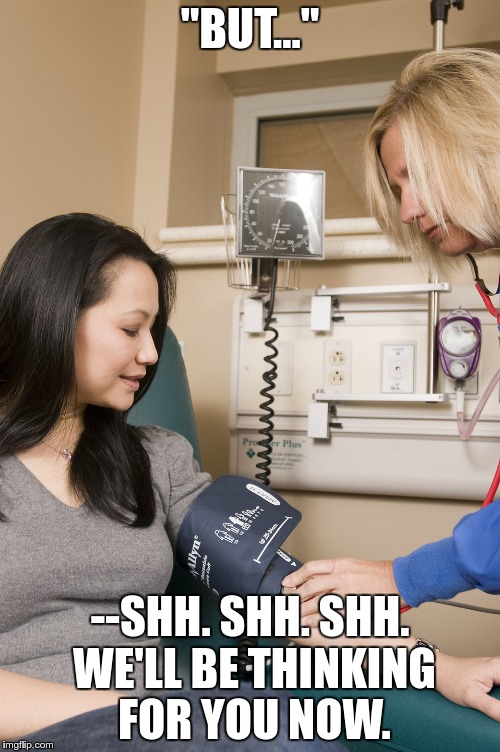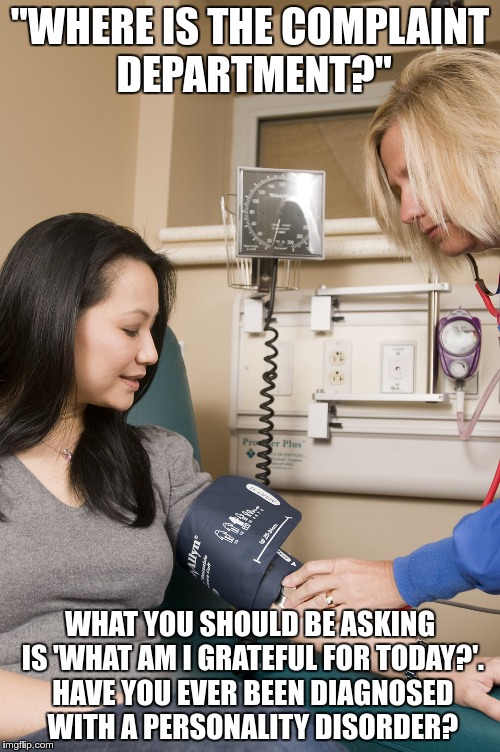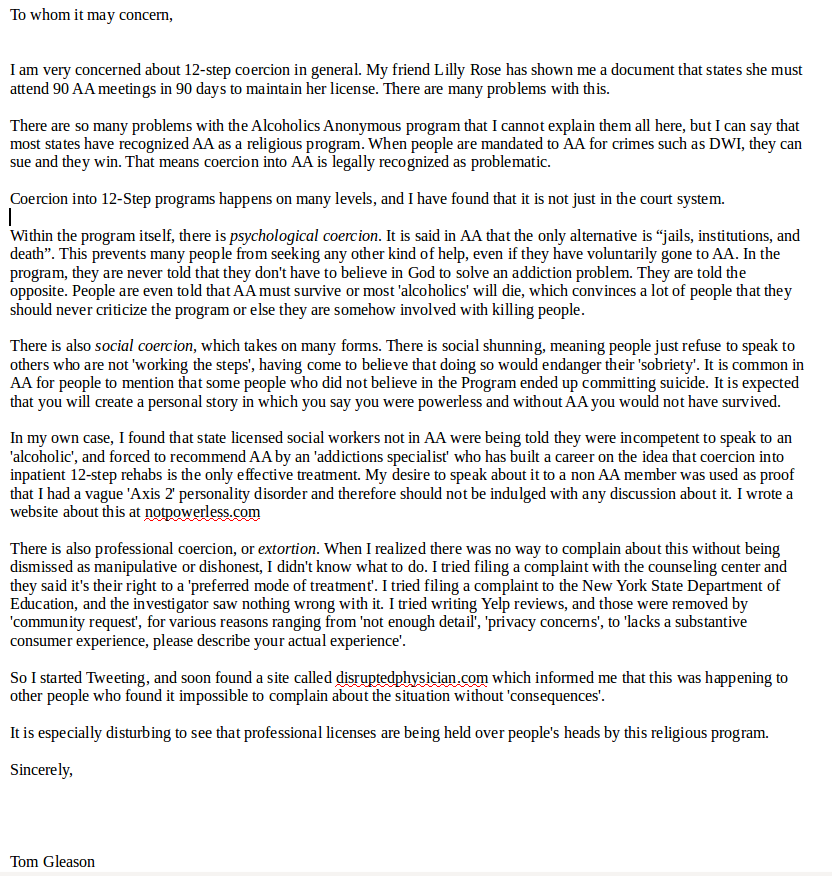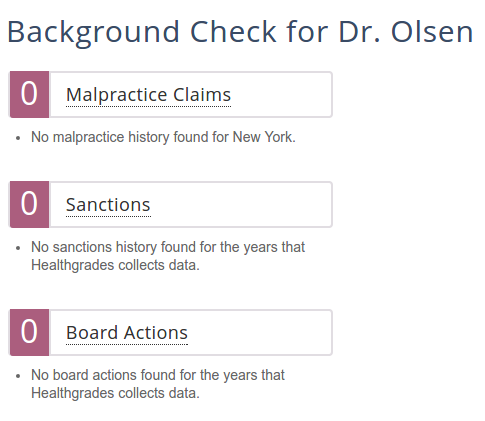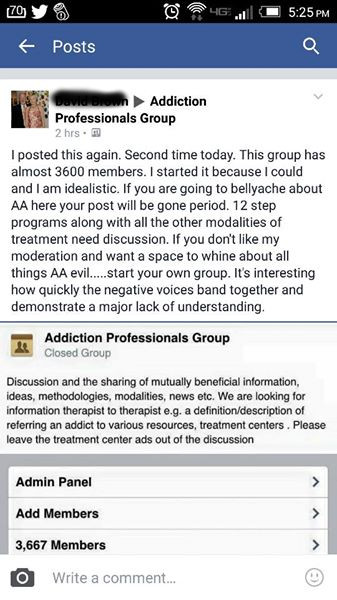Hospitals and Institutions committees organize Alcoholics Anonymous proselytizing in hospitals, mental health facilities, and jails. I think hospitals shouldn’t allow this. Informed consent is a big part of medical law, and they wouldn’t want to get sued, would they? Especially in mental health institutions, this is disturbing.
NYS OASAS Misuse of public funds
Watertown, Jefferson County ‘Outreach’ program mentioning ONLY AA, GA, SLA, NA, Alanon 12-step programs receives $1.75 million dollars from a state agency to continue pretending they’ve rarely seen a person fail.
Stateside
“I was kind of upset when I found out…”
“How are people not getting this information? He didn’t even know what SMART Recovery was… I literally had a counselor there tell me that if I didn’t get involved in NA I would probably die. That was a counselor, someone with their college degree in the field.”
This was my experience too (being shocked that nobody seemed to be aware that rejecting AA is a real option), except I delved more deeply into how and why this happens, which is the focus of this blog.
Michigan Radio Segment Highlights Secular Alternatives to Alcoholics Anonymous
Wilson’s Wonderland
Samaritan Institute – Complaint Process
update Jan 20 2020: Samaritan Institute is now called Solihten Institute.
David Olsen is on The Samaritan Institute Board of Directors (or he was when I wrote this), and he’s also the highest paid Executive Director of Samaritan Counseling Centers, which I’m sure has made it awkward for any serious complaint procedure to ensue.
He also supervises therapists (a few hundred supervised hours are needed to gain an LCSW license) and does paid CEU (Continuing Education Units) courses so that therapists across the state can retain their licenses. Yet he refuses to acknowledge very simple facts about 12-step problems. That’s a shady situation, don’t you think?
This is similar to how it was difficult to complain to the New York State Office of Professions about a member of their own board. I haven’t had much luck in general, but I can give a few ideas about who to complain to: Department of Health and Human Services, the state licensing boards, the professional organizations if any (like NASW, AAMFT), Higher Powers in the organization itself, Civil Rights associations, Organizations for Separation of Church and State (AU, FFRF). The Federal Trade Commission. Better Business Bureau, Angie’s List. Local, state, and national politicians. State social service organizations (like OASAS). Heck, I suppose you could file a police report since rehab fraud is most certainly theft by deception. You can also complain to business community networks who may want a heads up about what their members are involved with. Nothing seemed to really get addressed for me, but I still think this is important so I made this website.
Here, though, is how it’s supposed to work with complaints toward an Executive Director at a Samaritan Institute accredited Center. If this process had actually happened, then I would have received some kind of notice from Bev Shrumm, the Chair.
“All employees, contractors, and consultants are expected to maintain compliance with the ethical standards of the professional organizations and licensing/credentialing boards with which they and the Center are associated.
Procedure:
1. When an ethical violation is alleged against any employee, contractor, or consultant, the executive director will be notified. The executive director will undertake an initial inquiry and in turn notify the chair of the board or the chair’s designee. When an ethical violation is alleged against the executive director, the board chair will be directly notified and take responsibility for all inquiries and investigations.
2. A process, guided by the procedures of the professional organizations and/or licensing boards with which the Center and/or respondent is associated, will be designed to further investigate the complaint and take appropriate action. This process may include formally notifying the appropriate professional organizations and licensing boards of the allegation. Subsequently, those entities could initiate parallel investigations of their own. The risk manager of the Center’s liability insurance carrier must also be notified.
3. The board, meeting in closed executive session, will in all instances be informed that an ethical investigation is underway. All minutes and other records of the closed executive session will be sealed and not circulated. The board chair at his or her discretion may choose to limit the amount of information given to the board and may elect to consult with an attorney.
4. The confidentiality of all parties involved will be honored in the context of the laws and regulations applicable to the investigation and its outcome.”
Interview with Producer of Business of Recovery – “They are just hoping this goes away”
This is a great interview with Greg Horvath. He explains the motivation behind his movie, to make critical changes in the rehab industry: Regulation, Education, and Science. Because it sadly lacks all three. This is going to be a great movie for anyone who still has faith in this faith-healing industry.
Interview starts after 4 minutes and ends in about 30 minutes (around 34:00)
Irrational Authority and the 21st Century Medical Witchprickers
From DisruptedPhysician.com: “The New York City Medical Society on Alcoholism was started in the 1950s by Dr. Ruth Fox to promote AA and 12-step to doctors. This organization subsequently became the American Medical Society on Alcoholism (AMSA) and eventually the American Society of Addiction Medicine (ASAM). Like the National Council on Alcoholism and Drug Dependence (NCADD), an organization that promotes the A.A. yet claims to have no formal ties, the ASAM is considered by many to be a front-group that purports to represent one agenda while in reality serving other interests. The ASAM can be considered both a political (prohibition, 12-step spiritual recovery) and corporate (inpatient rehabilitation facilities, drug testing industry) front group in this regard.”
Alternatives to AA
I resisted calling the alternatives “cult escape attempts”.
“Dear President Obama,
A few years ago I sought help with addiction. Like most people, I was told to go to a 12-step program. It wasn’t until after about a year in the rooms that I even heard of other approaches – meaning, other than “Jails, institutions, and death”. So, given my available options, “Keep coming back” seemed reasonable.
This is actually a very serious problem because the public believes that a person only needs to get themselves to those meetings with an open mind and the 12-step recovery culture will solve everything.
There is a long and mostly unknown history of people who’ve left AA seeing it as counterproductive, pointless, or futile. In fact the majority of people do this. Some start new ‘recovery’ groups, some naturally switch their life focus to something healthier (which most do), and some who really feel that they have no options (because they have a “head full of AA and a belly full of booze”) kill themselves. This is when hiding information that doesn’t serve the interests of AA borders on criminal.
Most people are surprised and feel betrayed to find that there is a lot AA won’t tell you (like the fact that it fails for most people), and they usually notice that there is a LOT you can’t talk about in an AA meeting:
For example, try bringing up SMART Recovery in an AA meeting. You will likely be laughed out of the room for suggesting you could manage your life yourself. You will certainly go back to Step Zero for saying you don’t like the ‘powerlessness’ concept of AA. SMART Recovery was my first CLUE that something other than AA might be better for me.
Women For Sobriety was started in 1976 when a woman left AA, inspired by the Transcendentalist spirituality of Ralph Waldo Emerson’s ‘Self-Reliance’ among other spiritual teachings. She did not believe a Higher Power was necessary and did not accept the label of ‘powerless’.
Secular Organizations for Sobriety (SOS) is what an atheist came up with, to be free of the religious aspects of AA, which are very disturbing even to some devout Christians with theological concerns. Yes, some religious people would prefer a secular sobriety group to AA because their problem is alcohol, not their relationship to or understanding of God.
Rational Recovery had the same roots as SMART in Rational Emotive Behavioral Therapy (REBT) support groups before concluding that all of “recovery culture” is worthless, and AA is a destructive cult. Rational Recovery was my first clue that I didn’t have to accept or incorporate 12-Step into my belief system at ALL, and these may just be unhealthy ideas.
Some people noticed that “recovery” (or getting better) didn’t necessarily mean abstinence. Moderation Management is a group of people who choose to limit their consumption. This is an example of a group that was co-opted by AA. The founder was re-convinced she was a “real alcoholic”.
Out of MM grew HAMS which is very popular, because it gives people tools and support to make their heavy drinking safer, to moderate, or quit – whatever their goal is.
There are also those who prefer a scientific or biological approach, looking for medicines that prevent or reverse the physical processes of addiction.
So you can see there is a long history of “alternatives”. You won’t hear about these in an AA meeting, and yet any of them might help someone, or the whole intellectual history of these “alternatives”, their devaluation, censorship, or co-option by 12-step culture, could be instructive to anyone on their own personal journey.
Sincerely,
Tom Gleason
Addiction Professionals Culture of Bullying and Devaluation
OASAS Funds 12-step Promotional Organization?
Why is a 12-step promotional organization being funded by the government?
“In 1972, the Board of Trustees of Gamblers Anonymous in the New York City area requested their Spiritual Advisor, Monsignor Dunne, establish a Council on Compulsive Gambling to do what they could not do because of anonymity- call national attention to the increasing problem of compulsive gambling in the United States.
“Today, NYCPG is funded by the New York State Office of Alcoholism and Substance Abuse Services”
Here are documents explaining why this is very likely illegal: http://ojp.gov/about/ocr/pdfs/TwelveStepRecoveryPrograms_FAQs.pdf and https://www.oasas.ny.gov/mis/bulletins/lsb2002-05.cfm



